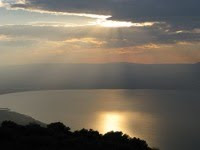 It's well worth reading. (And see also a fine post by Bill Heroman.)
It's well worth reading. (And see also a fine post by Bill Heroman.)In particular, Neil reminds us that we shouldn't 'live for success, but to follow Christ every day'. We need to be planting seeds that will grow and bear fruit for the future, not building structures that look alive but are not. A fossilised seed might look pretty much the same as a living seed, but plant them both, water them in, and wait... eventually you will see the difference!
Father's purpose and plan for each of us is a living seed, bursting with potential. This is what it means to have a heart of flesh. My own personal purpose and plan would be a mere fossil, a heart of stone. He has given me a heart of flesh in place of my original one of stone. Now I must use it in loving obedience - his plan not mine.
Neil quotes Bob Logan who said, 'Success is finding out what God wants you to do and doing it.'
Here's an extract from Neil's article. If you like what you see click through and read the whole thing, it's only two pages. It's also worth reading Mark Galli's earlier article to which Neil Cole is responding.
If we truly saturate our society with vital followers of Christ capable of making disciples, the world will change. I believe that simply connecting God's children to their spiritual Father in such a way that they listen to his voice and courageously follow his lead will transform society in broader, more holistic, and longer lasting ways than anything else we try.
The change, however, will not be for every generation. In fact, it could very well be that our most serious problems are caused by thinking the decisions we make today will be permanent. We end up establishing methods without the people hearing from God themselves and making their own choices. The result is a lifeless religious institution.
Homer Simpson once said, "I guess people never really change; or, they quickly change and then quickly change back again." In a real sense, all transformation is only momentary. There is a reason for this: We are called to live in the moment. Love is the fulfillment of all righteousness and it is always a choice. We are to love God with our whole being … every day. Who you are is really a lifetime of decisions made in specific moments, which make up the person you see in the mirror. God wants us to choose him every moment of every day, not just once at a middle-school retreat campfire.
Each generation must face its own tests and make its own choices. Our children do not become Christians because we choose to follow Christ, but because they do. If they are only living out the choices of their parents, their faith is not true and will remain fruitless religious conformity. This is also true for religious organizations.













